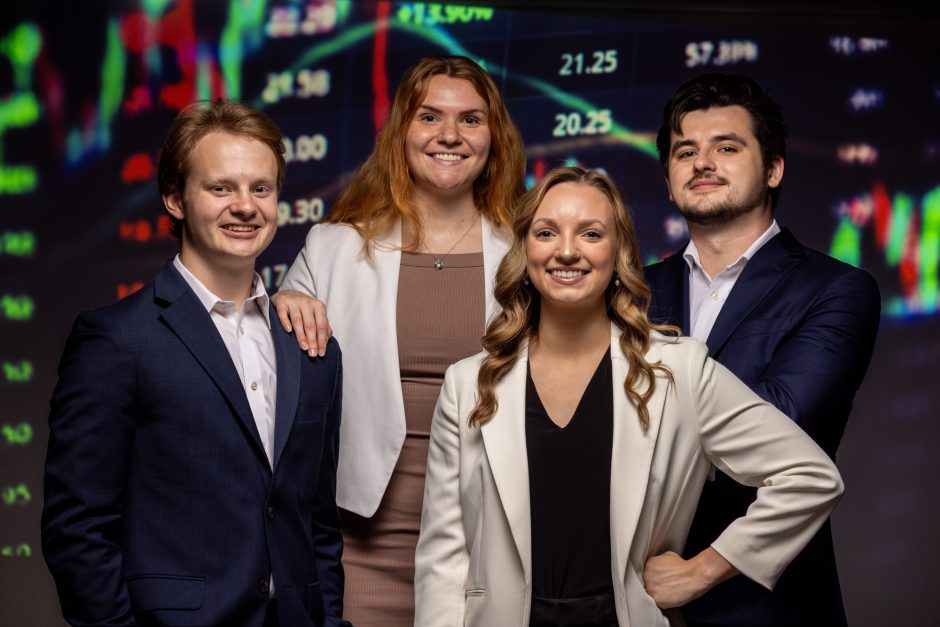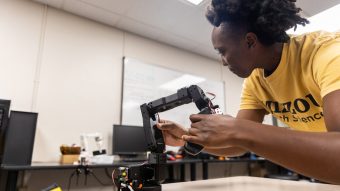
May 8, 2024
Contact: Deidra Ashley, ashleyde@missouri.edu
Photo by Abbie Lankitus
The stakes are high for students involved in the Allen Angel Capital Education (AACE) Program at the Robert J. Trulaske, Sr. College of Business.
This group of mid-Missouri investors is composed of University of Missouri students dealing with real money and real entrepreneurs. Their decisions to invest in high-growth startup companies are based on long hours of cultivating deal flows, performing pre-screening duties, completing due diligence and structuring investment contracts.
AACE is a hands-on, learning-by-doing course with a twist — it’s real life.
This semester, 17 students spanning seven Mizzou majors have been managing approximately $700,000 in assets, most of it deployed to 15 portfolio companies.
For some students like Kyle Klostermann, a junior majoring in accounting, AACE has been an opportunity to learn more about the other side of his entrepreneurial dream — the side of the investor tasked with determining whether an entrepreneurial vision is worth the investment. For others like Yuriy Snyder, a doctoral student in biological engineering, AACE has been an education in how engineers like himself can best pitch their ideas to investors and get them into the marketplace.
Both agree that working alongside students from other disciplines has broadened their insights and forced them to think more critically about angel and venture capital investment strategies.
“Everyone is bringing a different perspective to the table,” said Klostermann, who serves as a managing director for the group along with Snyder and two other students. “Being able to have all these different perspectives to consider before moving on to the next step of the process is an amazing opportunity.”
Investing in students
That’s exactly what W. D Allen was hoping when he and his sister, Pinney, launched the AACE program 12 years ago with donations of $25,000 and $500,000 respectively. Allen, an adjunct professor, coordinates the AACE program and oversees the course. He is quick to point out, however, that the students are in charge by serving as investment analysts to the fund by cultivating deal flow, performing pre-screening duties, completing due diligence, structuring and negotiating investment contracts, and monitoring portfolio holdings to ultimately drive financial returns for the fund.
“I sit back and marvel at what they are able to do,” Allen said.
Other advisors for the group are Kate Holland, an assistant professor of finance, and Gene Gerke and Steve Guthrie, co-presidents of Centennial Investors Angel Network.
Putting critical thinking to work
Before each semester, the managing directors of AACE run a three- to four-session bootcamp for members new to the investment world. Then, throughout the course, AACE advisors work with the students, who actively learn about angel and venture capital investment strategies through a balance of case studies, books and deal flow from actual companies seeking funding.
Grace Demetrician, another AACE managing director and junior who is pursuing a business degree with an emphasis in finance and banking, said while much of her education has stressed the importance of critical thinking, AACE has challenged her to balance her emotions with thinking critically – an interesting juxtaposition she hasn’t faced in many other classes.
“You walk the line between being excited for a startup company and wanting them to do well and thinking critically about that company and considering whether they’re a good investment,” she said. “It’s a balancing act that is made more urgent because we are dealing with real money.”
Another AACE managing director, Becca May, who is a graduate student in geology, said she has come to appreciate how each student has an equal stake in the course, an aspect that has leveled the playing field in a way unique to her academic experience.
“We each have one vote, and we have to come to an agreement, knowing that you might win some and you might lose some,” she said. “It’s been humbling and eye-opening for me.”
Because of the responsibility entrusted in them during AACE, the managing directors said they’ve grown more confident in their abilities to lead.
“When I got into AACE, I had no business background,” Snyder said. “Just going from science to business, I experienced a terminology gap that I had to overcome. It was difficult to learn a new style of communication, but it’s been so cool to step into a whole other world. I’ve developed a confidence that only comes from learning something completely new.”
Story written by Sara Diedrich



